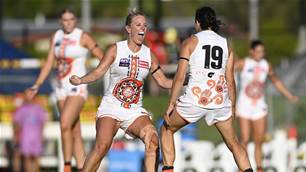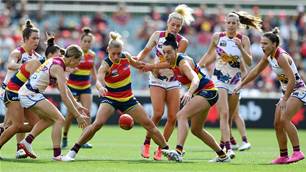The AFL's controversial move to make the AFLW a conference style competition has had an angry backlash. KATE O'HALLORAN gives her take on the row...
The AFL website went on to add that “extra matches would increase costs, including player payments, accommodation and travel, which are all footed by the AFL, rather than clubs.
"The AFL has indicated funding women’s football was a juggling act, with the need to invest in talent pathways around the country, as well as the main competition.”
The AFL has exercised some impressive mental gymnastics to extrapolate that because the players are struggling to cope with multiple competing demands, the solution is to shorten their season. These women thrive on playing football; it’s the reason so many of them willingly jeopardise a living for the privilege of pulling on their club’s guernsey.
Surely, in recognising the very real barriers to women’s participation in elite sport, the aspiration should be to level the playing field rather than reduce women’s time on it.

The most obvious starting point would be to remunerate players sufficiently so that they could fully focus on their AFLW careers. However, the text that accompanies Livingstone’s comments is revealing in this regard: the AFL sees the AFLW as a cost it must “foot” rather than an investment in future generations of women and girls playing the game they love; the game they have been too long denied equitable access to.
The folly, moreover, in the implication that the AFL has been “generous” in funding the AFLW to date is the fact that the AFL is a not-for-profit organisation that last year recorded a net surplus of $48.8 million.
As a not-for-profit organisation, the AFL must surely shoulder a social responsibility to ensure equitable access to its product and associated benefits: ones that are currently overwhelmingly enjoyed by boys and men at the expense of girls and women (especially trans and non binary people, as highlighted by the recent withdrawal of Hannah Mouncey from the AFLW draft).
If the AFL is serious about the “revolution” that AFLW has provided – inspiring a 76% increase in teams of women and girls playing Australian rules football after just its first year – then it must begin to see the AFLW as a social investment, rather than a deficit.
It must also commit to ensuring a situation in which the barriers that women face in participating in elite sport are seen as challenges to be overcome, rather than justifications to further inequity.
Related Articles

Socceroo star's message to kids: Don't be an AFL player

Updated: AFLW Round 2 preview and schedule













